Wolf Alice: new horizons
On new album ‘The Clearing’, Wolf Alice have found the sweet spot in paring back their ideas and pushing the best to the forefront, as they enter their most confident, self-assured era yet
By Tara Joshi
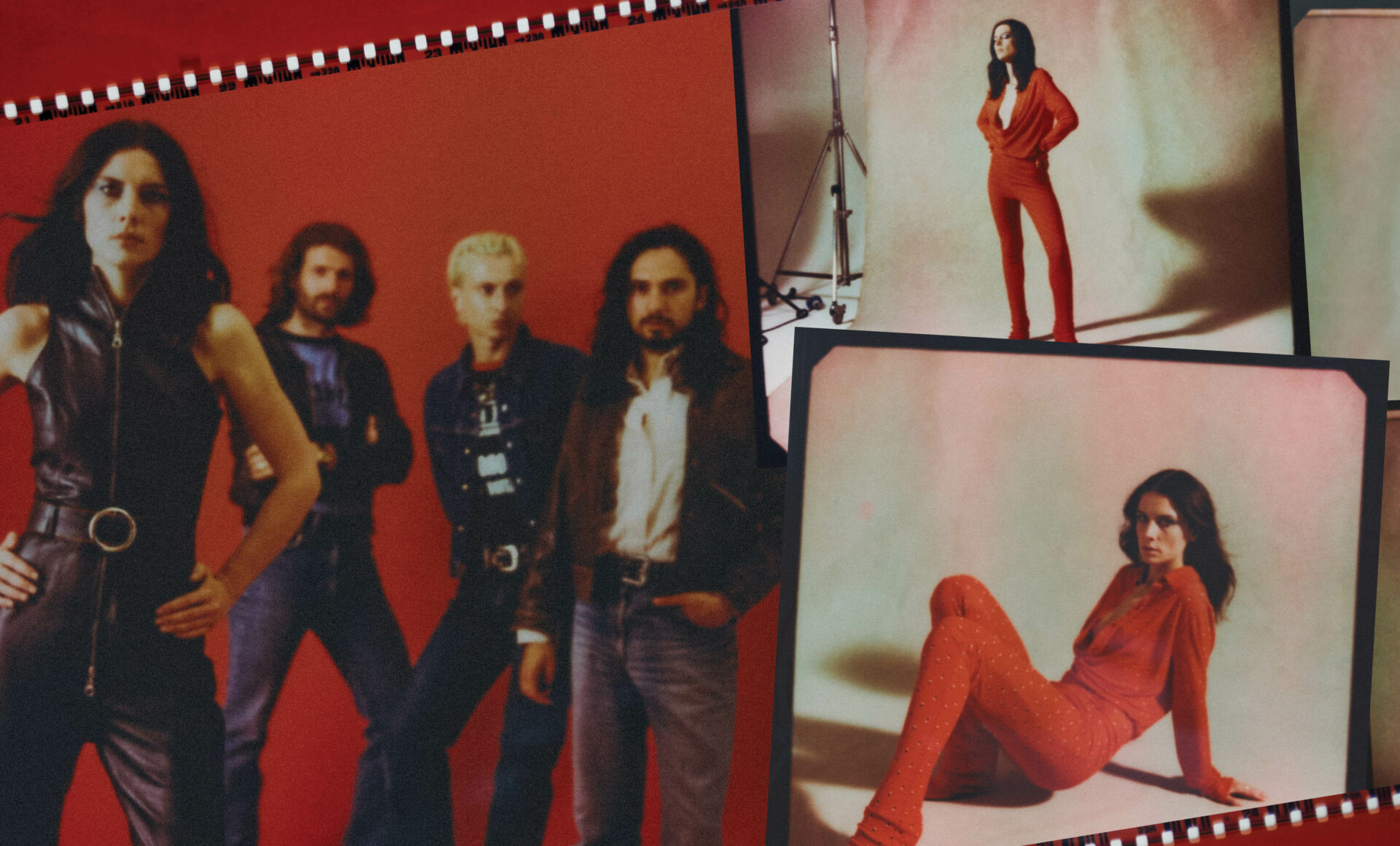
Ellie Rowsell is on the floor in a leather one-piece, straddling a wind machine like she’s channelling Stevie Nicks. As they watch their bandmate’s dark hair fanning out behind her, Joel Amey, Joff Oddie and Theo Ellis — each dressed in extreme amounts of denim — beam proudly, cheering Rowsell on and taking pictures with their phones.
Lately, Wolf Alice have been thinking about the mythology of being in a band. It checks out: the beloved north London four-piece have been together for well over a decade now — being in any job that long leads to reflection. Your thirties often involve pauses where you check in on where you’re at, how you’re spending your time, and whether you’re actually happy.
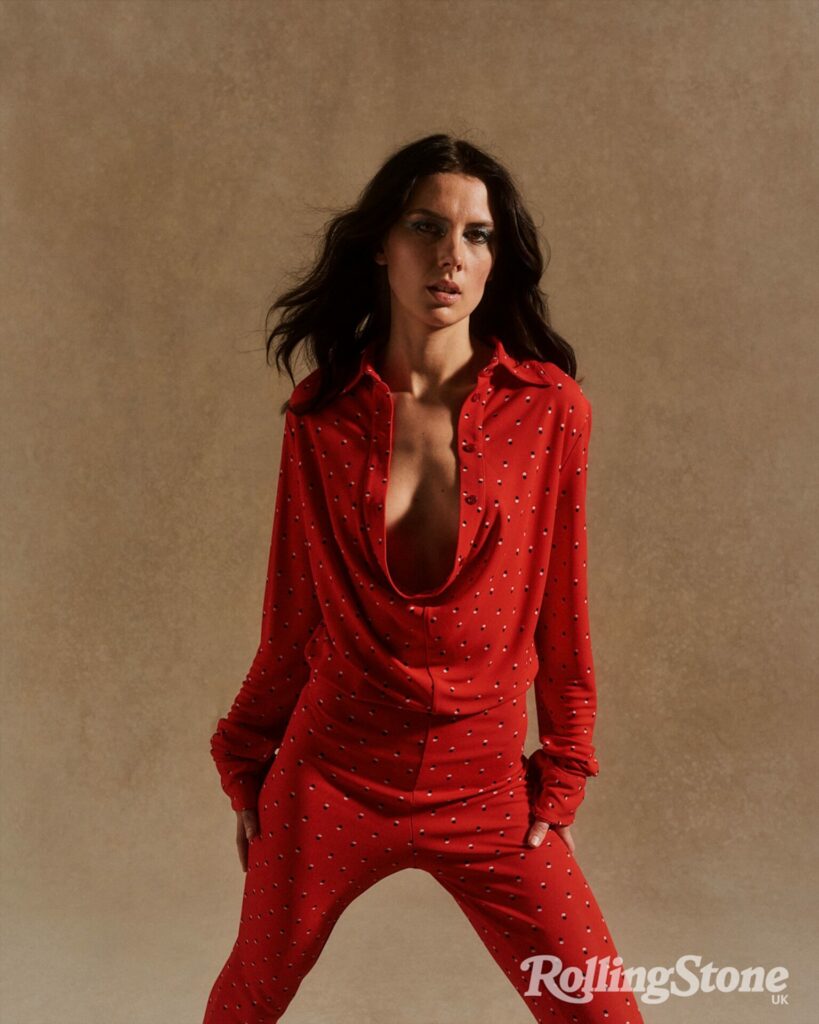
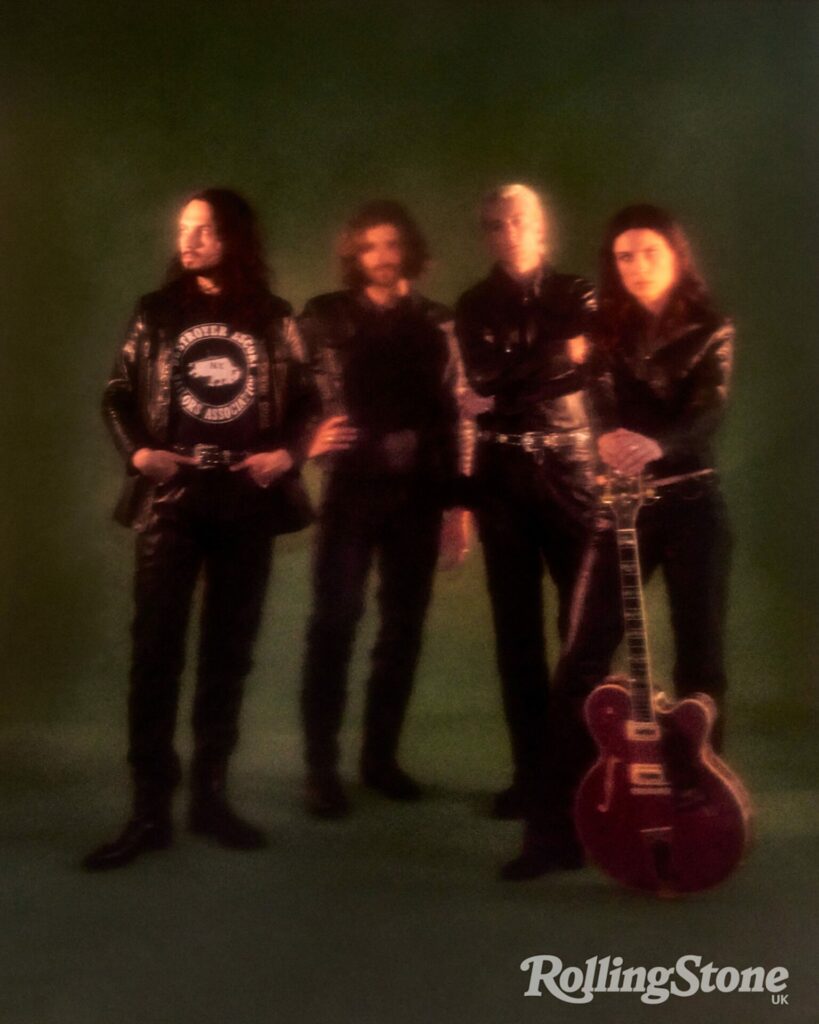
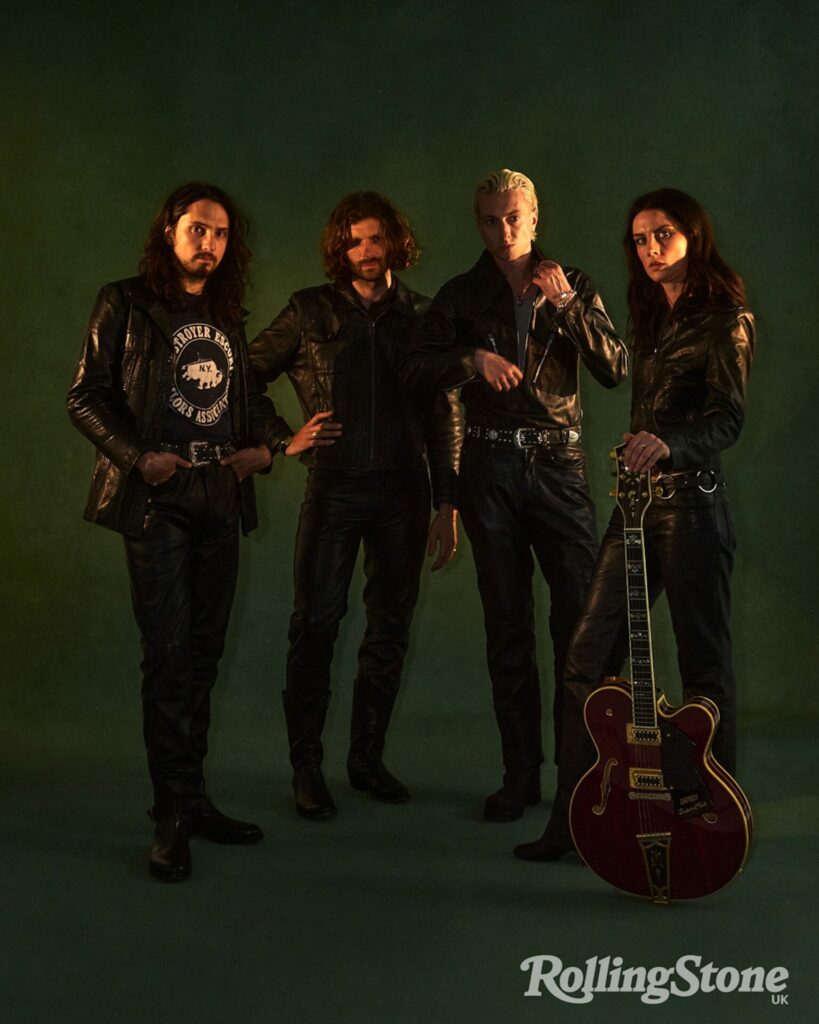
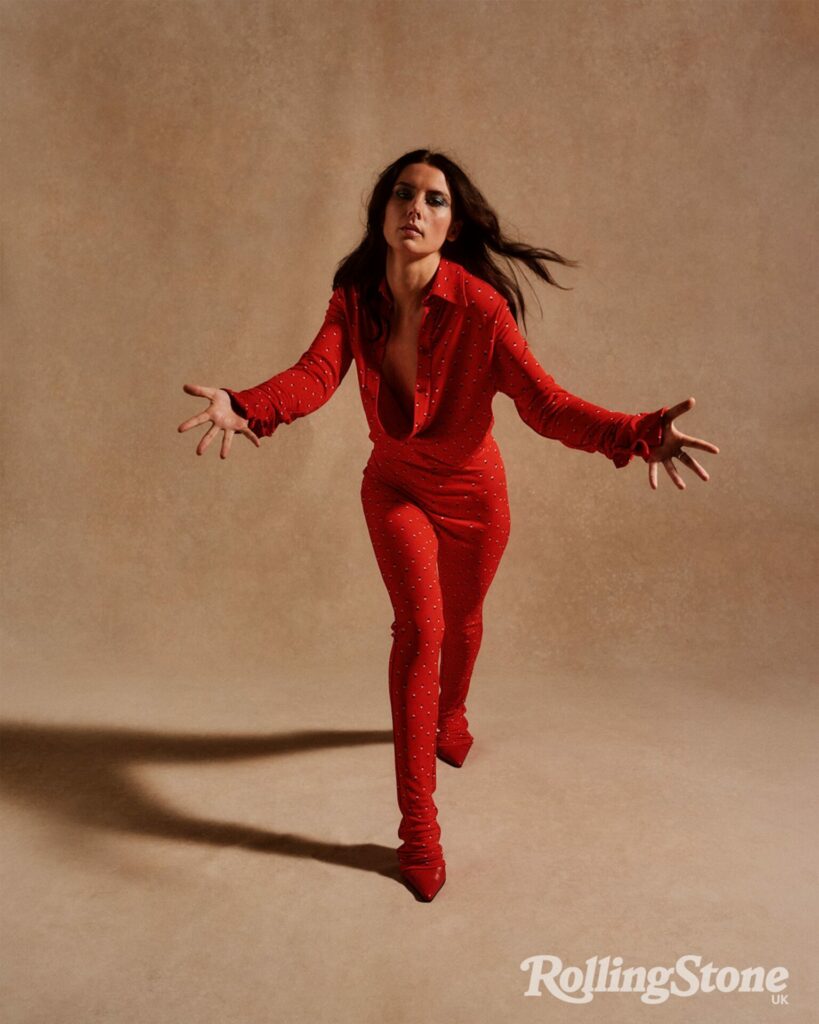
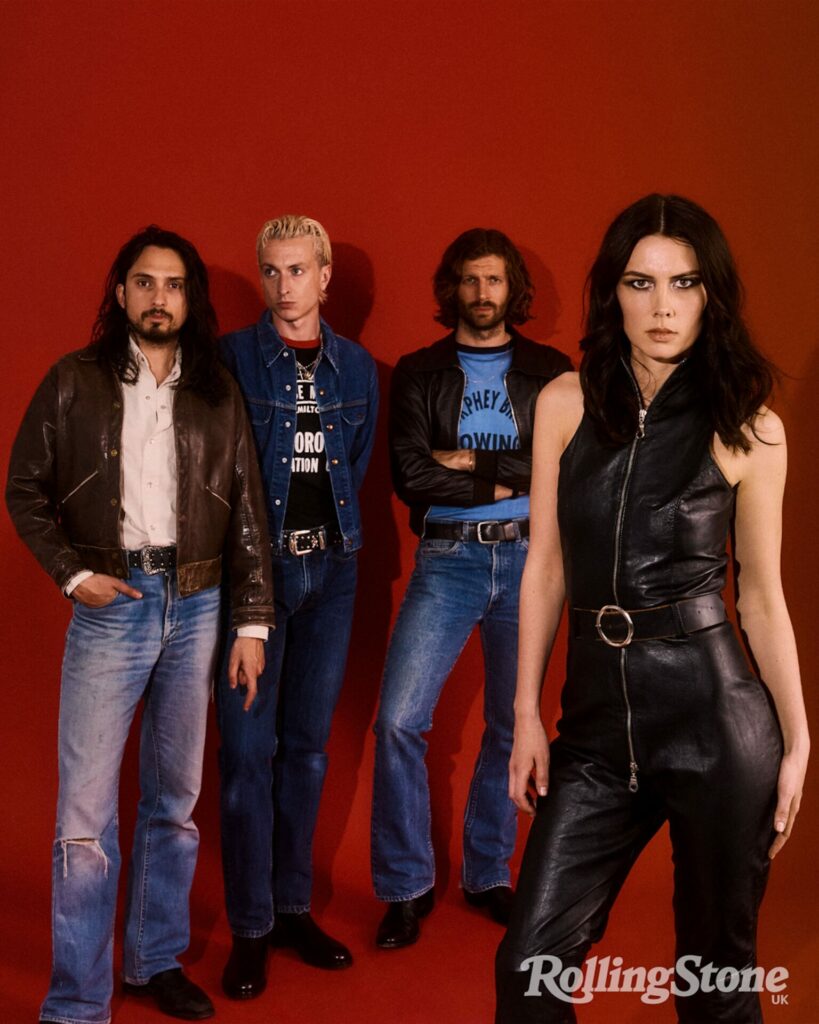
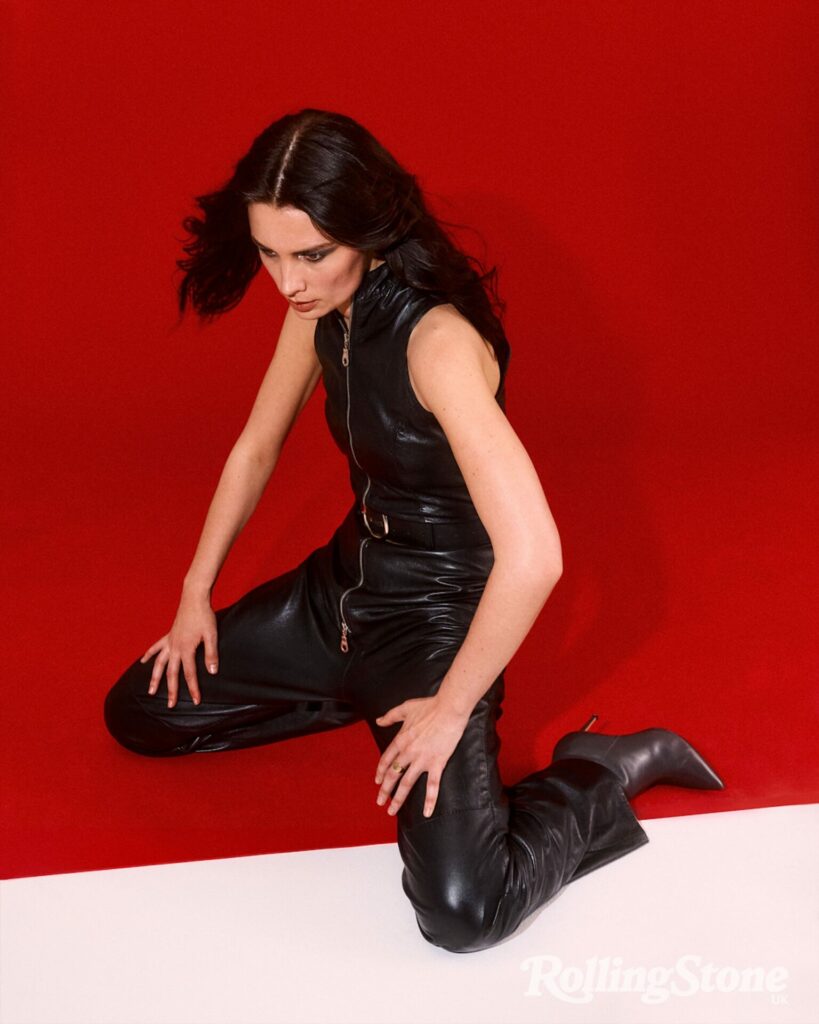
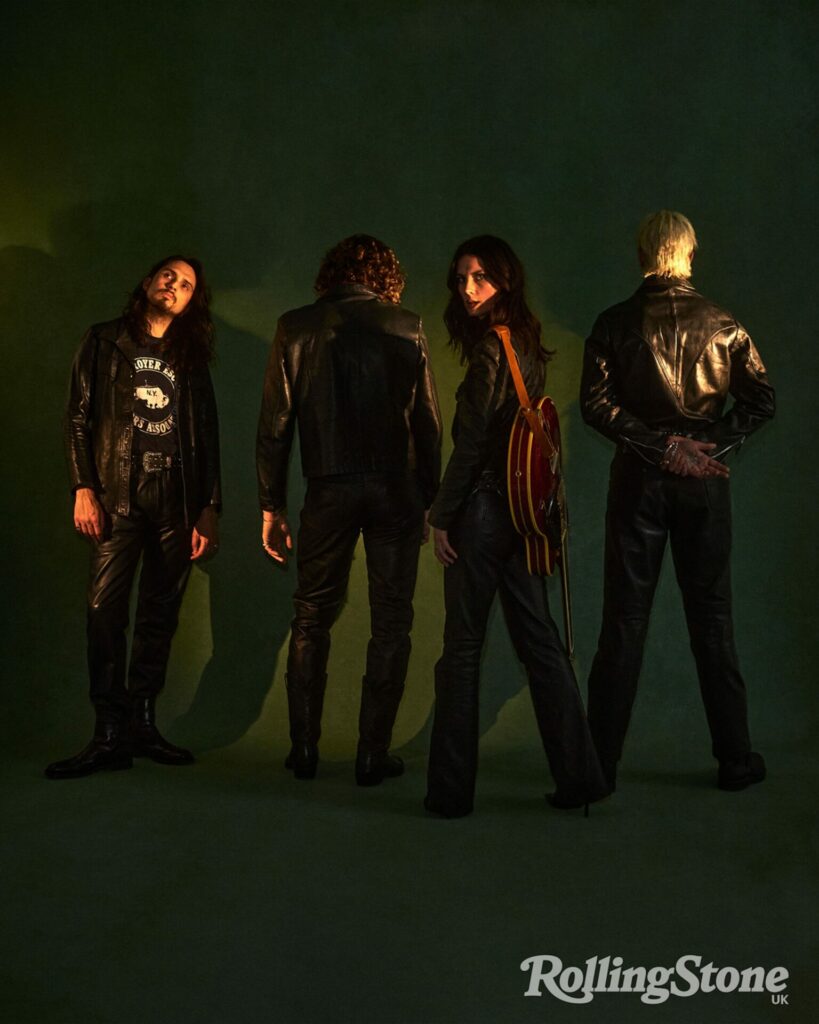
“We were playing with the idea of really owning being in a band,” explains bassist Ellis the week after the shoot, when discussing the promo images that have started teasing their way around the internet in the days before we meet — including one of him in a leather jacket studded with the words ‘Wolf Alice’. Perched somewhat awkwardly on a stool in the band’s current rehearsal space in Wembley (which, he deadpans, looks like a sixth-form college), Ellis continues: “The iconography of a band is guitars and leather and all those kinds of things. Obviously, everyone has done this before, but I think we wanted to play up to those stereotypes in a slightly more fun, reverential way […], kind of owning some of those totemic things that you associate with bands. And I think there’s a playful, fun thing in the 70s when you see some people doing it where it’s, like, not taking yourself so seriously.”
Of course, the roots of Rolling Stone magazine belong with that late 1960s and 70s rock ’n’ roll culture Ellis is talking about — but, in 2025, new music in the charts is noticeably dominated by solo artists — in part the result of a lack of resources for bands in a dwindling music economy. It is increasingly rare to see what drummer Amey refers to as “a band band”. And so, it makes sense for the four-piece’s new era to be, in some ways, an homage to the group’s historical lineage. It’s an acknowledgement of what came before, and the fact that, against the odds, Wolf Alice are still doing this, and going from strength to strength.
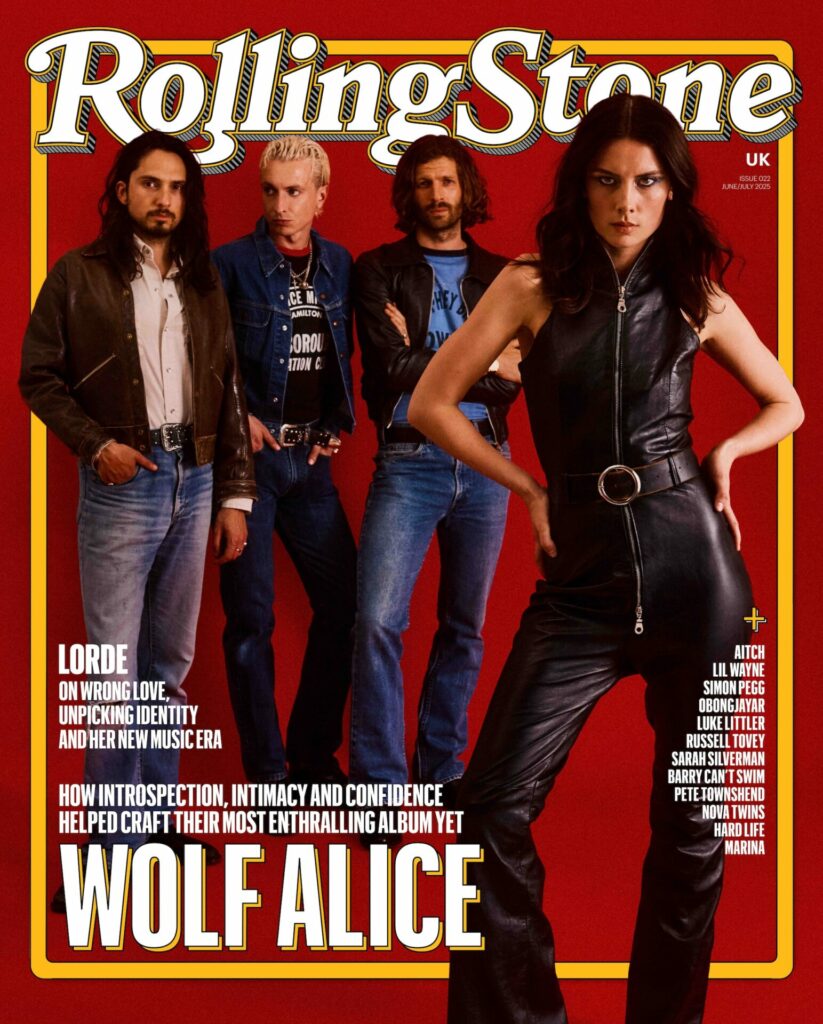
It was at the end of 2021, following the release of their phenomenally successful third album Blue Weekend, that Rowsell, the group’s lead songwriter, singer and multi-instrumentalist, watched Peter Jackson’s Beatles documentary, Get Back. She explains: “It wasn’t being inspired by what they were creating, but it was like… ‘Aw, I wanna get in the room and do that again,’ being kind of nerdy and stuff…”
Rowsell felt a reassuring universality in watching one of the most revered bands of all time just sitting down and playing their instruments and messing around. Wolf Alice started out as a folk group comprising Rowsell and Oddie some 15 years ago, but soon they began to feel that they needed to be louder to be heard, veering into the alt and indie rock-leaning sound they’re best known for. Get Back, coupled with the response to some of the songs on their last album, served as a reminder that there was more than one way to be a rock band. “Early on in our career, we made a lot of noise and jumped around and garnered attention that way,” explains guitarist Oddie, before adding: “And then I think with the last record, we gained a lot of confidence in things like ‘The Last Man on Earth’, ‘Delicious Things’ — more ‘songy’ songs that people really responded to. Really good songs just stand the test of time, and they can be dressed up however you want, regardless of what era, because if they’re great songs, they’re great songs.”
And so, this became the grand aspiration for album number four, The Clearing — their first release since their contract ended at Dirty Hit and the band signed to major label Columbia. The songs are still undoubtedly big, but in an analogue way, the core of them stemming from Rowsell writing behind the piano, giving the songs shades of Carole King, Fleetwood Mac and even ELO. A criticism that Wolf Alice have often faced is wearing their influences too readily on their sleeves and having too many disparate ideas — but in The Clearing, though the roots they’re playing with are evident, they have made their most cohesive album to date.

Produced by pop luminary Greg Kurstin, the melodies are huge and glorious, replete with silken harmonies and woozy, cinematic strings. Lead single ‘Bloom Baby Bloom’ is a magnificent, maximalist showcase of what’s to come, with Rowsell’s vocal range the star of the show (with an exquisitely choreographed and spangly leotarded video to boot). On The Clearing, her voice has transcended itself to become more lilting and powerful than ever. Rowsell’s pen is also engrossingly assured these days, as she sings wryly but tenderly of life decisions big and small. In previous times, she preferred burying her words in the scuzz, but now she says she wants to lean into clarity and let people hear what she’s saying.
After years as one of the most revered British bands of their generation, Wolf Alice are getting back to basics. But this is not in response to conversations about tech and AI — if anything, the band are quite open to TikTok and tech platforms in music (“A knee jerk reaction to anything because of age difference is a trap you can find yourself falling into as you get older,” says Ellis). Instead, they see their approach on The Clearing more as a way of reconnecting with an innate part of the band experience after the density of their last record. “I remember getting the stems back from the songs in Blue Weekend and being like, ‘I love this! But I can’t hear it, because there’s so many ideas,’” recalls Rowsell. “So I thought: ‘Next time, you’ve got to make sure all the ideas are the best ones, and if you can’t hear them, you take stuff out.’”
Previously, they had felt the pressure for each album to explore new sonic ground, and to showcase skill by getting as intricate as possible, but this time they recognised the bold potential of simplicity. As Oddie says: “When you’re a group of people and you spend years doing these songs, it’s quite brave to go, ‘Your contribution may be not doing something.’”
“There’s a power in giving less,” agrees Amey. “Obviously, for lots of bands it’s normal to just sit in a room with guitars and write. But for us, that was new and felt exciting […] It’s like in Get Back, how they’re all just looking at each other’s eyes, trying to work out what’s going on. There’s an intimacy.”

It’s an intimacy rooted in that strange, unique relationship that comes with being in a band. They clearly have a lot of affection and respect for each other (“I’m always more nervous emailing these three a demo than I am putting out a song to the rest of the world,” says Amey at one point). They’re aware that it can be an odd dynamic for outsiders to step into — although it quickly becomes clear over my week of interviewing them that the four-piece have cultivated an easy camaraderie with everyone in their circle. Take this rehearsal studio in Wembley, where the band are preparing their live show for upcoming performances including Radio 1’s Big Weekend and Glastonbury but have still found time to decorate the area around the mixing desk for their Front of House sound engineer Johnny Dodkins’ birthday (think bunting and bubbly). They gather round to coo at photos of touring keyboardist Ryan Malcolm’s new niece and, when I arrive, Amey takes me on an adventure through the surreal cavernous warehouse (“Have you ever seen Indiana Jones?” he quips), all in order to offer me a cup of tea.
This is how they are as a band: warm, welcoming, genuinely funny, albeit thoughtful if not entirely reserved. They take their time to answer questions — partly, it seems, out of a sense of protection for one another, stepping in to pick up the thread when one of them starts trailing off. They’ve never really had specific conversations about boundaries and trajectories, they say, because everything feels almost instinctive between them.
“It occupies a similar space to family, but it’s not,” Ellis offers as a hypothesis. “It’s work, but it’s friendship — but it’s art? It straddles all these different things. We all know each other, I think, in a very strange way, more than we know anyone else.”

If Wolf Alice were a TV show, critics would write earnestly about north London being the fifth character.
Back in 2010, Archway-born Rowsell had just finished school in Camden, having spent her teen years writing poetry, stories and songs on her guitar and GarageBand. She connected with Cornishman Oddie via a ‘find a bandmate’ internet forum, and the pair began making music inspired by the likes of Johnny Flynn, playing open mic nights in the local area. Joined by friends Sadie Cleary and James DC, they performed their first show as Wolf Alice at Highbury Garage, supporting April in the Shade, a band they’d met at Islington pub the Hope & Anchor. Later, when Cleary and DC left, friends of friends Theo Ellis and Joel Amey joined the group. Amey is from Effingham in Surrey (he was previously in a band called Mafia Lights, for any fellow 2010s music bloggers out there), while Ellis is from Islington and a staunch Gunner (he even appeared in Arsenal’s ‘Islington FM’ Adidas campaign a couple of years ago, with its slogan: “North London is never far away”).
Oddie was doing teacher training in south-west London, and by his own account didn’t think much of the capital before he and the band spent more and more time together in Camden. “And then I was like, ‘Wow! This is brilliant!’ It felt like… really my home,” he enthuses. Now, they have all lived in north London at some point (in fact, all of them still do, aside from Amey, who is based down in Hastings these days). When they won the Mercury Prize back in 2018 for second album Visions of a Life, the band celebrated that night by having a lock-in at the Hawley Arms, the notorious Camden pub synonymous with the 2000s British indie scene (there’s a video of Rowsell at the bar, using the trophy to knock over a train of Jägermeister shots into Red Bulls like dominos, to cheers from everyone there).

When we meet for our second interview, they choose Mannions, an eclectic green and yellow Irish pub in Tottenham. They suggest the pub because, as Ellis says, “We’ve been walking up and down this street for a good stint of Wolf Alice’s life.” It’s near where he lives now, and for a time he and Amey lived in a warehouse nearby. They recorded most of Blue Weekend at Cargo Rooms, a studio that’s a three-minute walk from the pub, and began the sessions for The Clearing at Ten87, another studio next door. Rowsell also hints that she’s enjoyed doing karaoke at the pub — though she does not expand on past forays or when she next plans to make an appearance.
In many ways, then, north London is where the band has grown up. The final song on The Clearing, ‘The Sofa’, finds Rowsell contemplating how rooted she is in her geography: “Didn’t make it out to California / Where I thought I might clean the slate / Feels a little like I’m stuck in Seven Sisters / North London, oh England / And maybe that’s OK.”
There’s a sense of contemplating fantasy versus reality that runs through The Clearing — as though ruminating on the sliding doors moments of your life and wondering if you’ve made the right choices. Over packets of crisps and fizzy drinks, the band talk about recognising how lucky they are to do what they do — but there’s still a sense of wondering what other things they might have done and craving a pause amid the stifling, relentless march of time. On ‘The Sofa’, those thoughts manifest as just wanting to lie down and watch reruns on TV.

Growing pains have always been a part of Wolf Alice’s oeuvre but, now all in their thirties, the sentiment comes with a feeling of acceptance. “I think a lot of it is like, maybe you think when you’re younger that you’re going to get older and understand yourself and everything around you a bit more,” says Rowsell. “And actually maybe getting older is understanding that you might never. You don’t always figure it out.” She pauses, then adds: “You don’t figure yourself out because you’re always changing.”
That theme of embracing constant change and a lack of certainty is central to the album. Like Plath’s fig tree, where The Bell Jar’s narrator wants to taste all the options life has to offer, but knows if she doesn’t choose, eventually they will all disappear like rotting fruit, The Clearing deals with a desire to play out the possibilities. Rowsell’s protagonist wants to settle down in a loving relationship, but also just to fuck someone; to do things you know are bad for you and revel in the pleasure of them, while also wanting something wholesome and nourishing; to know you don’t want children, but to be haunted by a baby screaming from its pram in the hallway all the same (the latter comes on standout quasi-lullaby ‘Play it Out’). There’s also a sparkly ode to women’s affirming friendships on ‘Just Two Girls’, with its knowing refrain of “you’re so right”. To Rowsell, it recalls an idea that she paraphrases from Miranda July, about how you spend your twenties waiting for your “real friends” to materialise, then your thirties understanding that they’re the friends you already have.
Where once she opted for ambiguity, Rowsell seems more comfortable with this kind of storytelling and vulnerability in her lyrics these days, embracing candour and fondness for love songs in the same breath as she embraces her position as formidable frontwoman. “It’s growing in confidence to not care whether people think I’m writing about myself,” she says, “and as I like the work more, it’s easier to feel more confident — not because I don’t like the old stuff, but more that I was learning.”
For her bandmates, supporting Rowsell as an ever-burgeoning songwriter is the main priority, and they talk about being very protective of her work when collaborating with producers. “If someone is trying to steer things differently to get more of a hook, you still fight for the sentiment,” says Amey, who has his own foray as lead singer/songwriter this time around on the captivating ‘White Horses’.
For Rowsell, this is all part of the band’s method of keeping things fun for themselves. “You’re always trying to challenge yourself to keep it fresh. So, with age and time and experience you just grow in confidence,” she says with a smile, her arms wrapped around her torso. “I used to think it would be embarrassing if something wasn’t good, where now I’m like, ‘Oh, well, I won’t let feeling embarrassed stop me from growing.’”

Acknowledging their experience leads them to analyse another aspect: if they started out today, would they even exist as a band?
At the 2025 Grammys, just two of the rock category nominees — IDLES and Fontaines D.C. — had released their debut album in the past 20 years. Clearly, the upper echelons of the music industry are not great at supporting new rock talent, but what’s even more concerning is the decimation of nurturing new bands at the foundation level. While there are plenty of exciting acts in the underground, the costs of being in a band — touring, rehearsal spaces — are only increasing, while small venues are disappearing and the income from music is decreasing — even more so when split between a few of you. Add to this the fallout of the Covid years, ongoing Brexit and Trump-era visa issues, and it’s no wonder that, for many emerging artists, there’s a growing appeal in just being solo — or not trying to be a musician at all.
“When I look back to our early career, and I think, ‘Could we do what we did back then now?’ I honestly think I’m not sure we could,” says Oddie of the current climate for bands. “We scraped it. Now costs have skyrocketed; there’s nowhere to rehearse anymore. Back in the day, we could do a half-day somewhere for £50 — now, I don’t think those places exist.”
“Not at that price point,” agrees Ellis, “and a lot of them have closed.”
Oddie concurs. “My big worry is that we miss the working-class voices that have made British music famous worldwide.”
The band are trying to improve matters. They have fundraised for grassroots music venues, and a few days after our interview, Oddie takes part in a government hearing about the lack of accessibility in music.
Though they endorsed and canvassed for Corbyn in 2019, Wolf Alice have never been incredibly political in their music (give or take Rowsell skewering the concept of male genius on ‘Last Man on Earth’ — a song perhaps more relevant today than when it was written). They consider the gender dynamics in the music industry — on the extreme end of the scale, like in 2021 when Rowsell called out Marilyn Manson for allegedly upskirting her at a festival, but also in everyday dealings with their team. “At least people are conscious of wanting their teams to be diversified — I don’t remember those conversations when we started,” says Rowsell.

They are trying to improve the world in other ways too, having in the past raised money for the NHS and for refugees. Oddie has spent time volunteering at a local food bank, while Ellis and Rowsell often repost information on social media about donating to Gaza.
All the same, they seem understandably reluctant to give a soundbite about the state of the world. “There’s a difference, isn’t there, between having pressure to use your voice and being engaged,” says Oddie. “And I think I would encourage everyone to be politically engaged. What you say versus what you do… I think it’s about trying to make informed decisions in your day-to-day, rather than people feeling like they have to say something without quite understanding what the thing is.”
“We all agree!” the rest of the band chorus in their typically playful, sibling-like way.
That Wolf Alice are still releasing music is not only testament to luck and timing, but their firm commitment to a shared ethos — and to one another. “How you choose to spend your time in your thirties feels like the stakes are higher,” says Ellis. “We have communal friends that are drifting into parenthood. But we’ve chosen to spend a lot of our time working on a communal thing. And I think we’re quite proud of that and we’re quite protective over the fact that we’ve got this far together.”
The result is a grown-up and gleaming album that feels like the sonic equivalent of stumbling across an old Polaroid: exciting, nostalgic, glowing. The Clearing is a testament to the enduring allure of a rock band with classic, affirming pop songs that make you feel larger than life. Or, as Amey candidly puts it, “I usually don’t really like our albums at this point in the campaign — you’ve heard it so much it’s almost detrimental to hear it again. But I’ve really enjoyed listening and rehearsing it. It’s been really joyful.”
Taken from the June/July issue of Rolling Stone UK, out May 29. Pre-order your copy here.
Photography by Oscar Lindqvist
Styling by Gary Moore
Stylist Assistant: Leonor Carvalho
Hair by Yumi Nakada-Dingle using Bumble and bumble.
Hair assistant: Erika Kimura
Make-up by Anna Payne at C/O Management using CHANEL Les Beiges Golden Hour Collection and No.1 de CHANEL Body Serum-In-Mist
